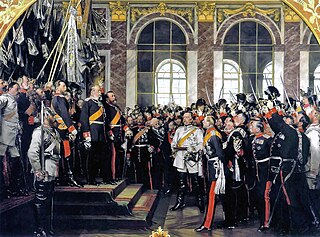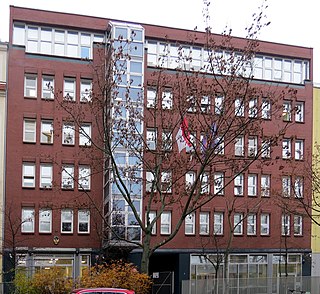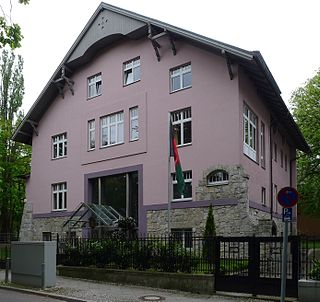The Federal Republic of Germany (FRG) is a Central European country and member of the European Union, G4, G7, the G20, the Organizations for Economic Co-operation and Development and the North Atlantic Treaty Organization (NATO). It maintains a network of 229 diplomatic missions abroad and holds relations with more than 190 countries. As one of the world's leading industrialized countries it is recognized as a major power in European and global affairs.
Suzhou Singapore International School (SSIS) is a private school for children of foreign personnel in Suzhou, Jiangsu, China.

China–German relations, also called Sino-German relations, are the international relations between China and Germany. Until 1914, the Germans leased concessions in China, including little parts of Yantai City and Qingdao on Shandong Peninsula. After World War I, during which the Germans lost all their leased territories in China, Sino-German relations gradually improved as German military advisers assisted the Kuomintang government's National Revolutionary Army, though this would change during the 1930s as Adolf Hitler gradually allied himself with Japan. During the aftermath of the Eastern Front, Germany was divided in two states: a liberal and democratic West Germany and a communist East Germany. Cold War tensions led to a West German alliance with the United States against communism and thus allied against the People's Republic of China (PRC). The Eastern part was allied through the Soviet Union with the PRC. After German reunification, relations between Germany and China improved.

Maximilian August Scipio von Brandt was a German diplomat, East Asia expert and publicist.

The Consulate General of the United States in Shanghai is one of the five American diplomatic and consular posts in the People's Republic of China.

The Chinese Embassy in Berlin, officially the Embassy of the People's Republic of China in the Federal Republic of Germany is the head of the diplomatic mission of the People's Republic of China in Germany. There has been diplomatic mission of China in Berlin since 1877. The current embassy is located at Märkisches Ufer 54 near the Jannowitz Bridge in Luisenstadt in Berlin-Mitte. The seven-storey building, built in 1988 as the FDGB headquarter, was rebuilt from 1999 to 2001 to the present-day embassy.

The proclamation of the German Empire, also known as the Deutsche Reichsgründung, took place in January 1871 after the joint victory of the German states in the Franco-Prussian War. As a result of the November Treaties of 1870, the southern German states of Baden, Hesse-Darmstadt, with their territories south of the Main line, Württemberg and Bavaria, joined the Prussian-dominated "North German Confederation" on 1 January 1871. On the same day, the new Constitution of the German Confederation came into force, thereby significantly extending the federal German lands to the newly created German Empire. The Day of the founding of the German Empire, January 18, became a day of celebration, marking when the Prussian King William I was proclaimed German Emperor at the Palace of Versailles, outside Paris, France.

The Embassy of the Republic of Indonesia in Berlin is the diplomatic mission of the Republic of Indonesia to the Federal Republic of Germany. In addition to the embassy, Indonesia has two consulate generals in Frankfurt and Hamburg.

In 1861, Prussia and the Qing dynasty signed the first Sino-German treaty during the Eulenburg Expedition. West Germany established diplomatic relations with the Republic of China (Taiwan) in 1955. Germany today considers the People's Republic (PRC) as "the sole representative of China, of which Taiwan is a part." It has deepened its economic and other informal relations with Taiwan while trying to preserve strong ties with the PRC.

The Embassy of Afghanistan in Berlin is the diplomatic mission of the Islamic Republic of Afghanistan to Germany. Yama Yari has been the ambassador since February 3, 2021.
The Duchy of Brunswick-Lüneburg and the United States began relations in 1848 with mutual recognition but both countries never established formal relations. Relations continued in 1867 when the Duchy joined the North German Confederation. Relations would eventually end with World War I when the U.S. declared war on Germany.
Relations between the Free Cities of Bremen, Lübeck, and Hamburg and the United States date back to 1790s when Hamburg became the first of the republics to recognized the U.S. on June 17, 1790. Bremen followed suit on March 28, 1794. Diplomatic relations were formally established in October 1853 when the U.S. received Rudolph Schleiden as Minister Resident of the Hanseatic Legation in Washington, D.C. Relations ended in 1868 as the republics joined North German Confederation.
The German Embassy in New Delhi is the diplomatic representation of Germany in the Republic of India. Since November 2020, the German Ambassador to India is also accredited to the Kingdom of Bhutan.

Germany–Morocco relations date back to the 19th century. The German Foreign Office describes Morocco as a "central partner of the European Union and Germany in North Africa," and Germany is an important trading partner for Morocco. In the past, however, relations have not always been entirely free of tension.

Inner German relations, also known as the FRG-GDR relations, East Germany-West Germanyrelations or German-German relations, were the political, diplomatic, economic, cultural and personal contacts between the Federal Republic of Germany and the German Democratic Republic, at the period of the West-East division in German history from the founding of East Germany on 7 October 1949 to Germany's reunification on 3 October 1990.

Germany–Venezuela relations have a long tradition and were officially established in 1871. During Nicolás Maduro's tenure, relations have deteriorated and in 2019 Venezuela declared the German Ambassador Daniel Kriener a persona non grata; however, he was able to return to the country soon after. Close relations with Venezuela continue to be maintained by parts of the German left and the political party Die Linke.











